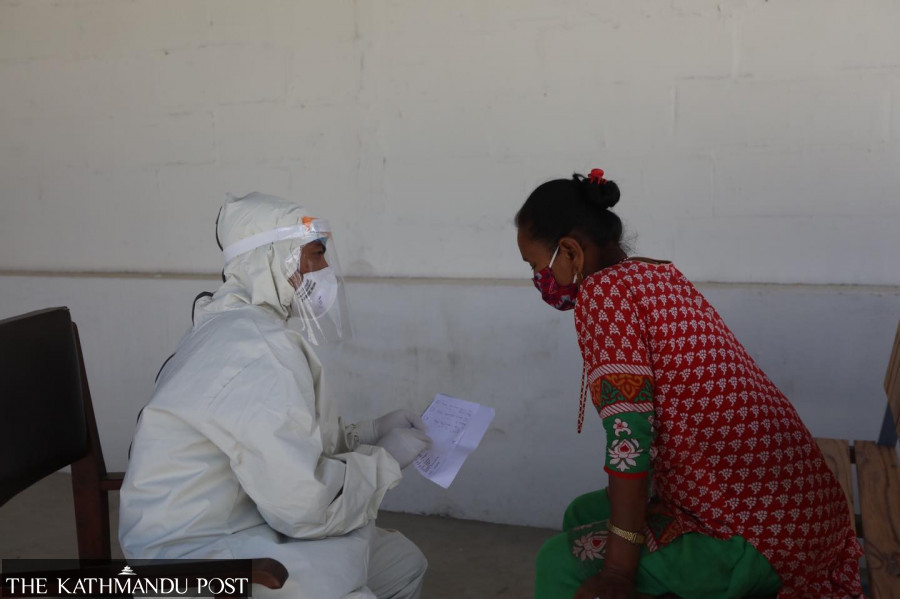Health
What is lacking now: Covid counselling and isolation facilities
Over 97 percent infected are currently in home isolation and some patients are getting distressed and panicked, but there is no proper medical counselling mechanism.
Arjun Poudel
At midnight on Tuesday, a 25-year-old woman from Mandikhatar, Kathmandu called the Covid helpline of Danfe Care, an organisation that runs telemedicine services.
The woman, who is five months pregnant, was in panic as she was infected with Covid-19.
“She was worried about the fetus growing in her womb, as she had fever due to infection and stomach ache due to persistent cough,” Kabin Maleku, programme head of the organisation, told the Post. “A gynecologist from our organisation counseled her and prescribed some medication.”
Currently, thousands of people throughout the country have been infected with coronavirus, as the disease has spread to communities. And due to lack of information among patients about the Covid do’s and don’ts and a proper medical counselling mechanism, some infected patients are getting distressed and panicked.
Officials at the organisations said that for the last two weeks, they have been getting over 100 phone calls every day from infected people, and health workers and staff at the organisation have also been getting dozens of calls on their personal phones from Covid patients.
Most pregnant women are afraid to take medicine for fever, cough and other problems, according to Maleku.
On Monday, a man in his early 40s from Buddhanagar Kathmandu called the hotline of the organisation.
The man said that he and his wife had Covid-like symptoms and two guests, who came to stay in his home, have tested positive.
“The man was worried, as his mother is a patient of chronic obstructive pulmonary disease and needs oxygen support all the time,” said Maleku. “He had also met his mother-in-law, who was exhibiting flu-like symptoms, which made him more worried.”
According to doctors at the organisation, the man explored the possibility of staying in an isolation center to prevent the infection from passing to his mother, but there would be no one at his home to take care of his mother if he and his wife both stayed in isolation.
And what is concerning is, authorities have still not felt it necessary to revive isolation centers even though the third wave of the pandemic has already taken the country in its grip.
On Thursday, 12,338 people tested positive for Covid-19—10,052 in 21,007 polymerase chain reaction tests and 2,286 in 6,490 antigen tests. It is the highest number since the start of the pandemic.
Of the total infected people, 6,981 were from the Kathmandu Valley—5001 of Kathmandu, 1,130 of Lalitpur and 850 of Bhaktapur.
Four people died of Covid-19 infection in the last 24 hours.
Daily positivity rate of polymerase chain reaction tests has reached 47.9 percent.
According to the Ministry of Health and Population there are 37,093 active cases in the three districts of the Valley.
Doctors say that the ministry’s data includes only those who underwent testing and not everyone is opting for tests due to the cost among other concerns.
“Entire families are getting infected and very few people are undergoing tests,” Dr Prabhat Adhikari, an infectious disease and critical care expert, told the Post. “As the authorities have not revived the isolation centers, telemedicine services like that of Danfe Care have been giving some relief to many infected people, who are distressed, panicked and really need help.”
And what is concerning is the authorities have not shown interest in reviving isolation centers, which were filled with infected patients during the first and the second wave of the pandemic.
“The importance of isolation centers has not lessened, but currently infected people themselves are not seeking isolation services,” Dr Samir Kumar Adhikari, joint spokesperson for the Health Ministry, told the Post. “Unlike in the past, local units are also not keen on reviving isolation facilities.”
According to the Health Ministry, active Covid cases across the country stand at 57,328. Of them, 55,836 people (over 97 percent) have been placed in home isolation.
But government authorities have not been monitoring the conditions of the infected persons. Contact tracing has stopped.
With regard to vaccination, so far, 12,579,242 people or 41.4 percent of the total population have been fully vaccinated. Likewise, 43,318 people have received their booster shots as of Thursday.




 11.84°C Kathmandu
11.84°C Kathmandu















